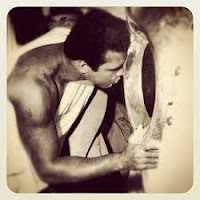First let me say I'm recovering from my surgery, and let me thank the many kind wishes I received in the comments.
 |
| Sharif Hussein in 1916 |
Between my health and the
Journal's deadlines, it's been a while since I dealt with the centennial of the First World War in the Middle East. But June marks a century since the outbreak of the Arab Revolt led by Sharif Hussein of Mecca, or the Great Arab Revolt as it is sometimes known.
We've talked about the Hussein-McMahon correspondence and the genesis of the idea on more than one occasion, Interpretations of the significance (or peripheral nature) of the Revolt have differed widely, with what might be called the British and Hashemite view of history playing up its importance. The role of T.E. Lawrence has enhanced the mythology surrounding the Revolt, and added to the emphasis on the tribal and guerrilla aspects of the Revolt, at the expense of the regular Sharifian Army. There will be plenty of time to debate the myths versus the realities; let's begin with the outbreak.
On May 28, 1916, Ronald Storrs, Oriental Secretary, left Cairo, accompanied by Lt. Cdr. D.G.Hogarth, archaeologist and intelligence agent, and Captain Kinahan Cornwallis, the latter two attached to the Arab Bureau. With them was £10,000 destined for Amir ‘Abdullah, son of Sharif Hussein and their main interlocutor with him at this time. They were also authorized to promise another £50,000 to the Sharif after the actual outbreak of the promised revolt.
Reaching Jidda on June 5 they did not find ‘Abdullah as expected (who was in fact preparing for the revolt), but rather a message saying his youngest brother Zayd was coming instead. Zayd arrived with a message promising simultaneous attacks at Mecca, Medina, Ta'if, and Jidda. Indeed, on June 5, Hussein's sons ‘Ali and Faisal made an initial attack against Medina, and on June 6 Zayd met with Storrs and informed him of this. The main revolt had been moved up from June 16 to June 10.
But Medina was a very different target than Mecca would prove to be. A strong Ottoman garrison of 10,000 under Fakhri Pasha defended it, and it was the railhead of the Hejaz Railway, which allowed easy resupply from Damascus.
Ironically, the very same day as the attempt on Medina, far away in the North Sea north of Scotland, HMS
Hampshire, en route to Russia, was torpedoed and sunk with all hands. One passenger was far more famous than the others: the Secretary of State for War, Lord Kitchener of Khartoum, former virtual ruler of Egypt and Storrs' former boss. A failed tribal raid on an Ottoman provincial capital would garner no headlines in London.
Kitchener was a national hero. Liberator of Khartoum, master of Egypt and, since the outbreak of war, the most famous recruiting poster. Though disliked by his subordinate officers and the rest of the Cabinet, he was idolized by the public and by Tommy Atkins in the trenches,and his death was a national shock. Egypt, where Kitchener was still known just as "the Lord" (
al-Lurd) as Cromer had been before him, was also in shock.
Meanwhile, on June 10, Sharif Hussein proclaimed revolt in Mecca, declared the Young Turk regime had betrayed Islam, proclaimed an Arab Caliphate, and attacked the Turkish garrison in the Holy City. After a short siege, Mecca mostly was under control by June 13, though resistance continued until July 9.
 |
| HMS Fox |
On June 10 also, ‘Abdullah attacked Ta'if. The town was soon taken but the garrison hunkered down in the fort.
The port of Jidda was critical as a means of supplying Mecca and the rebels. The Royal Navy moved an aging, obsolete warship, HMS
Fox, and a seaplane tender, HMS
Ben-My-Chree, a converted Manx packet steamer.
 |
| HMS Ben-My-Chree (note hangars) |
The rebels attacked Jidda with support from
Fox's guns and air cover from
Ben-My-Chree's seaplanes, and the garrison surrendered on June 16.,
Once Jidda was taken, the British began creating a series of ports along the coast controlled by the Royal Navy, provided Hussein with artillery from the Egyptian Army, and began assembling a regular Sharifian Army from Arab officers and men of the Ottoman Army assembled from POWs and deserters.The Arab Revolt had begun.





 An Egyptian Administrative Court has annulled the April agreement with Saudi Arabia transferring the islands of Tiran and Sanafir to Saudi sovereignty.
An Egyptian Administrative Court has annulled the April agreement with Saudi Arabia transferring the islands of Tiran and Sanafir to Saudi sovereignty. 




